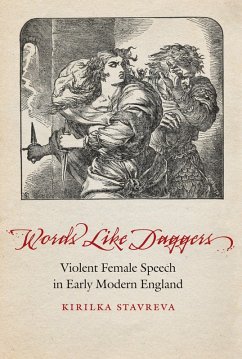Dramatic and documentary narratives about aggressive and garrulous women often cast such women as reckless and ultimately unsuccessful usurpers of cultural authority. Contending narratives, however, sometimes within the same texts, point to the effective subversion and undoing of the normative restrictions of social and gender hierarchies. Words Like Daggers explores the scolding invectives, malevolent curses, and ecstatic prophesies of early modern women as attested to in legal documents, letters, self-narratives, popular pamphlets, ballads, and dramas of the era. Examining the framing and performance of violent female speech between the 1590s and the 1660s, Kirilka Stavreva dismantles the myth of the silent and obedient women who allegedly populated early modern England. Blending gender theory with detailed historical analysis, Words Like Daggers asserts the power of women's language-the power to subvert binaries and destabilize social hierarchies, particularly those of gender-in the early modern era. In the process Stavreva reconstructs the speech acts of individual contentious women, such as the scold Janet Dalton, the witch Alice Samuel, and the Quaker Elizabeth Stirredge. Because the dramatic potential of women's powerful rhetorical performances was recognized not only by victims and witnesses of individual violent speech acts but also by theater professionals, Stavreva also focuses on how the stage, arguably the most influential cultural institution of the Renaissance, orchestrated and aestheticized women's fighting words and, in so doing, showcased and augmented their cultural significance.
Dieser Download kann aus rechtlichen Gründen nur mit Rechnungsadresse in A, B, BG, CY, CZ, D, DK, EW, E, FIN, F, GR, HR, H, IRL, I, LT, L, LR, M, NL, PL, P, R, S, SLO, SK ausgeliefert werden.

